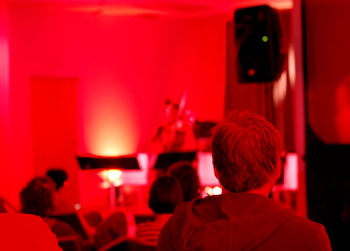
My liberal arts education began, strangely enough, with a book that explored why stereotyping was necessary and good. The author’s point (sorry–for the life of me I cannot remember his name or the title of the text) was not to encourage the blanket hatred of groups of people or the dismissal of new thoughts and ideas, but rather to suggest that without stereotypes, it would be impossible to function. Sure, we need to remain open to contradictions in our personally formed stereotypes and amenable to modifications, but if we didn’t have them in the first place and instead had to think through every interaction we had from the beginning, we’d probably find it impossible to locate the car keys and leave the house.
I’ve been thinking a lot about what the identifying “new music” stereotypes are, and some of you have been leaving comments with similar thoughts and questions. If we’re not cool like the jazzers, not hip like the indie rockers, and not formal like mainstream classical musicians, what are we? As a genre, it seems we are uncomfortable, or at least not cohesive. We cannot be recognized as a group for who we are musically by the presentation of our concerts or the slant of our cowboy hats. It’s easy to see how this freedom is liberating. But is it also paralyzing and, to some extent, a little lonely–each new ensemble and collective trying to make it up fresh for themselves?Â
Instead of borrowing identifiers from our neighboring genres, which often fit us poorly, I’m curious: If you were passed the magic scepter and told you could dictate, how would you want new music to be stereotyped? Of course that’s not how it works. A stereotype is an average–and a popularity contest (for better and worse). But if the music itself has no common practice, can (or should) the presentation and the performers have some semblance of one anyway? Instead of glancing left and right at what the other kids are doing, what tailored-to-fit features could we make distinctly (and comfortably) our own?Â

i am alt-classical, kyle gann is postclassic, Dennis Bathory-Kitsz and David Gunn likes the term non-pop.
but that doesn’t really settle anything does it? i bet if we step back from how we define ourselves i think its much easier to describe from what musical traditions and performance practice we come from(or what those cool indie rockers call “scenes”)
i come from the southern california “cartesian” school (1979) that was led lloyd rodgers (and tangentially influenced by doug leedy) and continues today with composers like doug moshier, william houston, john brenner and paul greenhaw.
http://tiny.cc/AwdQQ
i think part of the problem of this common identity crisis is that university training deprives students of finding their “voice” all for the goal of being “marketable”. young composers are encouraged to have a portfolio of a wide variety of styles to show their technique which is more suited to scoring movies.
like in any “scene” strong voices come out of the pack and terms are created to define the mean. i think history has shown no matter how much we try to define ourselves the labels become common practice are created as a function to define a real “there-there”.
I have three questions:
1. Why isn’t this music functional?
2. Why should we try to summarily describe so many different people?
3. What’s wrong with film music? (why can’t it count as “art” music?)
“But if the music itself has no common practice, can (or should) the presentation and the performers have some semblance of one anyway?””
Molly, the composers I have heard and read about thanks in part to blogs like this one seem to(to my ears anyway) create music that fits quite comfortably into the realm of contemporary chamber and orchestral music. One reason why Alex Ross’ book has been so popular (well, at least here in NYC…) is that it presents a 20th century composition as a tradition – a time line – that contemporary composers can identify with.
Within that time line there was and continues to be a lot of reactive infighting – but the music itself continues to be birthed from an old school approach to making music – it has a “common practice.” It has for some time now. That’s why “composition” can be taught in a University setting.
Of course, George Lewis has presented another time line altogether in his new book…
By the way, isn’t it strange that already in this thread we’re perpetuating the stereotype of “new music” as resulting from University training. Lord, help us!
john,
i’m not sure if your commenting on my comments or molly’s?
there is nothing wrong with film music in general and it can serve as art music. one example is the michael nyman/peter greenaway collaborations.
To me, that freedom is the stereotype. No matter what, you’re going to hear stuff that you don’t hear every day, and that isn’t limited by someone else’s idea of what music is supposed to be. That’s not very specific, but I think it captures the creative impulse that is shared by those who call themselves composers.